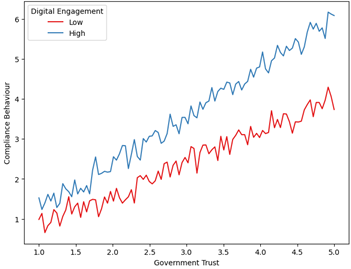The Role of Government Trust, Professional Trust, and Digital Engagement in Public Health Compliance: Evidence from the COVID-19 Pandemic
Keywords:
Digital Engagement, Economic Inequality, Compliance Behaviour, Structural Equation ModelingAbstract
This study investigates the relationship between government trust, professional trust, and public compliance behaviour during the COVID-19 pandemic, while examining the moderating roles of digital engagement and economic inequality. Drawing on survey data collected from a representative sample of citizens, we employ a structural equation modeling approach to analyze both direct and indirect effects. The results reveal that higher government trust positively influences compliance behaviour, with professional trust partially mediating this relationship. Digital engagement strengthens the effect of government trust on compliance, whereas perceived economic inequality weakens it. These findings underscore the importance of fostering institutional trust, promoting professional credibility, and leveraging digital platforms to enhance policy adherence. From a policy perspective, interventions aimed at reducing inequality and improving transparency through e-government services may increase compliance, particularly among vulnerable populations. The study contributes to the literature on trust, digital governance, and public health behaviour by highlighting the complex interplay between socio-economic, technological, and institutional factors in shaping citizen compliance during crises.

